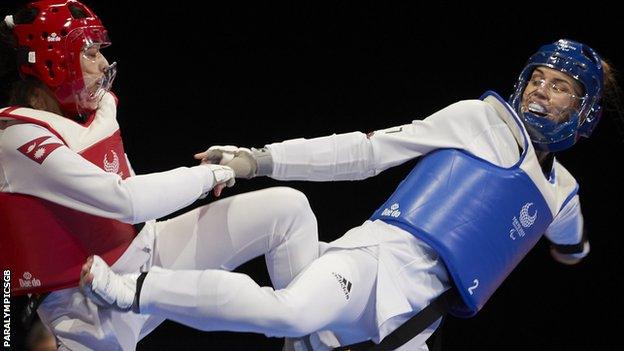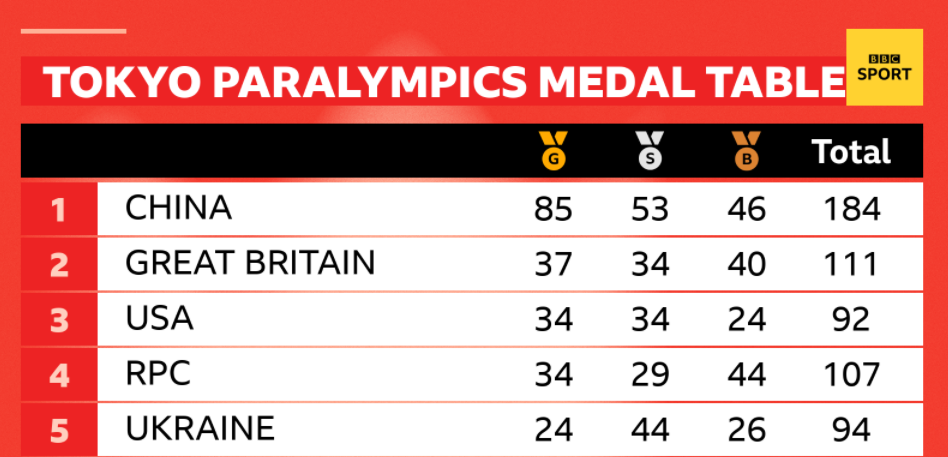Tokyo Paralympics: Great Britain win three golds and pass 100-medal mark
- Published
Tokyo Paralympics: Great Britain's Emma Wiggs wins gold in VL2 canoe sprint
Paralympic Games on the BBC |
|---|
Venue: Tokyo, Japan Dates: 24 August-5 September Time in Tokyo: BST +8 |
Coverage: Follow on Radio 5 Live and on the BBC Sport website |
Great Britain won three more gold medals as they passed the 100-medal mark on day 10 of the Tokyo Paralympics.
The golds went to canoeist Emma Wiggs and athletes Jonathan Broom-Edwards and Owen Miller.
Friday's successes mean that GB has now won medals across 16 different sports in Japan - the first time the feat has been achieved by any nation in one single Games.
Wiggs was victorious in the VL2 200m event - the first time that the Va'a boat, which is an outrigger canoe with a support float and is used with a single-bladed paddle - has been raced at the Paralympics.
She will aim to defend her KL2 kayak title on Saturday.
World champion Broom-Edwards, a silver medallist in Rio, went one better this time in the T64 category by clearing 2.10m with his second attempt for gold after he needed three efforts at 2.07m.
Miller, making his Paralympic debut, put in a strong final lap to win the T20 1500m in three minutes 54.57 seconds, ahead of Russian Alexander Rabotnitskii.
However, Richard Whitehead had to settle for silver in his bid to win a third 200m title in row, losing out to South African 19-year-old Ntando Mahlangu in the T61 category. And defending champion Hollie Arnold could only take bronze in the F46 javelin.
Arnold led going into the final round with 39.05m but was overhauled by both world record holder Hollie Robinson from New Zealand (40.99m) and Dutchwoman Noelle Roorda (40.06m).
Beth Munro made history with Britain's first taekwondo medal at the Paralympics with silver in the -58kg event.
The 28-year-old from Liverpool, who only took up the sport in late 2019, lost 32-14 to Denmark's Lisa Gjessing, the four-time world champion.
The GB men's wheelchair basketball team will play Spain for bronze on Sunday after a 79-68 loss to hosts Japan in the semi-finals.
It is the sixth Games in a row that GB have been in the third and fourth play-off.
On the final day of the swimming programme, there was heartbreak for Britain's Stephen Clegg who was beaten to gold by 0.06 seconds in the final of the S12 100m butterfly.
Clegg, the world record holder, who had won two bronzes earlier in the Games, lost out to Raman Salei of Azerbaijan.
"I'm going to be lying if I say I'm not gutted with that performance today," he said after clocking 57.87 seconds. "I definitely had a different colour in mind coming into this."
Tokyo Paralympics: Great Britain's Stephen Clegg wins silver in men's s12 100m butterfly
There was also silver for wheelchair tennis pair Gordon Reid and Alfie Hewett in the men's doubles, the tandem pair of Sophie Unwin and her pilot Jenny Holl in the women's B road race and for the class 6-7 table tennis team of Will Bayley and Paul Karabardak.
The universal relay team of Libby Clegg and her guide Chris Clarke, Jonnie Peacock, Ali Smith and Nathan Maguire were upgraded to silver from bronze after China were disqualified. USA took the gold.
Reid and Hewett lost out in a final-set tie-break to Stephane Houdet and Nicolas Peifer in a repeat of the Rio final.
Unwin and Holl beat Sweden's Louise Jannering and Anna Svaerdstroem in a sprint for silver after Ireland's Katie-George Dunlevy and Eve McCrystal made a late charge for gold.
Bayley and Karabardak faced a tough task against the Chinese pairing of Liao Keli and Yan Shuo and having lost the opening doubles, Bayley was beaten in his singles match as their opponents wrapped up a comfortable win.
There were bronzes for Jordanne Whiley in wheelchair tennis singles, Jeanette Chippington and Rob Oliver in Para-canoe and athlete Hannah Taunton.
Whiley won Britain's first women's singles medal at the Paralympics with a 6-4 6-7 (7-9) 6-4 victory over Dutchwoman Aniek van Koot.
Chippington, 51, who is competing in her seventh Games having made her debut as a swimmer in Seoul in 1988, finished third behind Wiggs while there was also bronze for team-mate Oliver in the KL3 event.
And Taunton, who like Miller competes in the T20 category for athletes with an intellectual impairment, ran a personal best to grab bronze in her 1500m final.
Tokyo Paralympics: Great Britain's Owen Miller wins gold in men's T20 1500m
Wiggs paddles to glory
Wiggs won gold when Para-canoe made its debut in Rio but had wrist surgery in 2018 which left her fearing for her sporting future.
She had a tough rehabilitation which she described as leaving her "feeling completely lost and probably for the first time in my life I felt disabled, with a little wrist injury".
Back to full fitness, she led from the front to win in 57.028 seconds, more than four seconds clear of Australia's Susan Seipel with Chippington third.
"It does feel just incredibly emotional," she added. "I'm just so overwhelmingly grateful to the Japanese people and the organising committee to get these Games on. It was so important for the continued progression of Paralympic sport that we were here.
"I love the fact I can leave my wheelchair on the side of the lake and paddle off and no-one walking their dog can tell which bits of you work and which bits don't."
Munro shines on Games debut
Munro was born missing her left hand and played netball before attending a disability sport event in 2019.
It looked like Paris would be her target until she was fast-tracked onto the GB Taekwondo programme for these Games.
She might have been one of the least experienced competitors in her event but beat world champion Li Yujie from China to reach the decider against Gjessing.
But the Dane used all her skill to control their bout and win, leaving Munro with mixed feelings.

Munro (right) was only competing in her second competition
"I'm ecstatic with a silver but I'm a bit disappointed in the outcome," she said.
"I probably let it get away from me in the first round and then tried to play catch-up the rest of the way.
"But for the short journey I've been on, to come away as a Paralympian with a silver medal, I'm so glad."

World watch
Pakistan won their first Paralympic gold medal thanks to discus thrower Haider Ali, who was showing his athletic versatility.
Ali won his nation's first medal with silver in the long jump in Beijing in 2008 and followed that up in Rio with bronze.
He concentrated on throws for Tokyo and got his reward in the F37 category, throwing 55.26m to beat the rest of the field by 2.83m.
Chinese shooter Zhang Cuiping won her third consecutive women's 50m rifle three positions SH1 title, improving her own Paralympic record on her way to gold.
Zhang scored 457.9 with Germany's Natascha Hiltrop second on 457.1.
And American swimmer Elizabeth Marks took gold in the women's S6 100m backstroke.
Marks, who was injured while serving as a soldier in Iraq in 2010, was due to compete at the 2014 Invictus Games in London but fell ill on the eve of the Games and needed emergency treatment at Papworth Hospital in Cambridgeshire.
Marks went on to win four golds in the 2016 Invictus Games in Orlando but returned one of the medals to Prince Harry to present to the hospital's medical team.

Back to Life: How do you start again when everyone remembers your past?
Vigil has launched: Watch the deep and dark new thriller from the producers of Line of Duty
